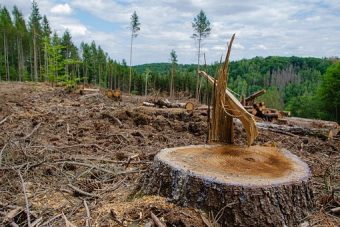
The world must halt deforestation, plant trees to make the planet greener and restore productive capacities, and use forests and trees sustainably, QU Dongyu, the Director-General of the Food and Agriculture Organization of the United Nations (FAO), today told the opening of the 26th Session of the Committee on Forestry (COFO).
COFO26 is being held in hybrid format from 3 to 7 October at FAO’s Rome headquarters and will provide a platform for exchange and dialogue among participants and provide suggestions for FAO’s work in forestry.
Princess Basma Bint Ali of Jordan, FAO’s Goodwill Ambassador for Near East and North Africa, Cécile Ndjebet, Founder of the African Women’s Network for Community Management of Forests and the winner of the Wangari Maathai Forest Champions Award 2022, and Analí Bustos, World Forestry Congress Youth Forest Change-makers winner also spoke at the opening.
Part of the solution
Forests cover 31 percent of the world’s land surface, store an estimated 296 gigatonnes of carbon and are home to the majority of the world’s terrestrial biodiversity. They are a source of fibre, fuel, food and fodder, and they provide livelihoods for millions of people, including many of the world’s poorest. Forests help mitigate and adapt to climate change and improve soil, air and water quality. If sustainably managed, forests are also a source of renewable raw materials.
In his opening remarks at COFO26, Qu said the impacts of the climate crisis and humanitarian emergencies are being felt more than ever around the world, hitting the most vulnerable the hardest. He pointed to droughts, floods, fires and storms of increasing frequency and intensity. At the same time, he said there are overlapping crises from the global pandemic, economic downturns, and price increases of food, feed, fuel and fertilizer. Hunger continues to rise, reflecting growing inequalities.
“Deforestation and land degradation, together with biodiversity loss, are devastating our ecosystems. This must change and stop,” Qu said. “As set out in the Seoul Declaration, forests and trees must be considered a key part of the solution.”
Qu pointed out that there are only seven more years to reach the 2030 Agenda and the Sustainable Development Goals.
The know-how and the tools are available, he said. “Now, we need to implement, scale-up and accelerate action – and, above all, we need political will and a package of solutions.”
He said FAO’s flagship publication, the State of the World’s Forests 2022, which will be discussed during the Session, offers three concrete, interconnected solutions.
Firstly, Qu said halting deforestation is “key to tackling the climate crisis by both cutting greenhouse gas emissions by 14 percent and safeguarding more than half the Earth’s terrestrial biodiversity.”
More:
In addition, another solution is planting trees, restoring productive capacities, and improving ecosystem resilience. The Director-General pointed out that “1.5 billion hectares of degraded land can be restored. Increasing tree cover could raise economic sustainability, which is essential to boost productivity to meet growing demands.”
Thirdly, he stressed the importance of using forests and trees sustainably and building green value chains. “Wood and bushes are a very valuable renewable resource, and an important source of carbon-neutral and even carbon-positive materials. Wild-harvested forest foods improve food security and the nutrition of people living nearby and beyond,” Qu said.

Qu also stressed the importance of smallholders, local communities and Indigenous Peoples, who own or manage nearly 1 billion hectares of the world’s forest and farm land. He said they must be at the center of efforts towards sustainable agrifood systems, of which forests and trees are an integral part.
This COFO Session will advance the global forest agenda on climate change, sustainable production and consumption, restoration, biodiversity, and finance and provide technical recommendations on emerging forestry and policy issues, Qu added.
Taking into consideration both FAO’s flagship report, The State of the World’s Forests 2022: Forest pathways for green recovery and building inclusive resilient and sustainable economies, and the outcomes of the XV World Forestry Congress held in May 2022 in the Republic of Korea, the Committee will review FAO’s forestry work under FAO’s Strategic Framework 2022-2031. Ongoing work by FAO on resilient and sustainable economies, the linkages between agriculture and forestry, and forest solutions for combating climate change will also be on the agenda. In this regard, Qu highlighted that for the first time agriculture and forestry were being discussed as a joint agenda item, which is an important step to identify and scale-up win-win solutions for food security and nutrition that protect forests and trees.
Two key reports will be released during the session: the Global forest sector outlook 2050: Assessing future demand and sources of timber for a sustainable economy and Mainstreaming biodiversity in forestry.
FAO’s work on forestry
FAO carries out a broad range of activities concerning the forestry sector.
FAO, together with United Nations Development Programme (UNDP) and United Nations Environment Programme (UNEP), has been supporting over 60 countries in reducing deforestation and forest degradation, through the UN-REDD programme. The Organization’s work on forest law enforcement, governance and trade help countries combat illegal logging and promote trade in timber, which is sustainably produced by small-scale enterprises.
FAO’s Sustainable Wildlife Management Programme is spearheading efforts to ensure optimal health for people, animals and the environment as part of a One Health approach, while strengthening wildlife management and enhancing food security of local communities.
Improving forest-based livelihoods, prosperity and human well-being is the aim of the Forest and Farm Facility. More than 25 million people in 30 countries have directly or indirectly benefitted from this initiative, including during the current COVID-19 pandemic.
FAO’s Action Against Desertification in support of Africa’s Great Green Wall Initiative has helped to restore the productivity of degraded lands and the livelihoods of local communities in the Sahel. Its support in ten countries has resulted in over 56 000 hectares of land being restored.
FAO, together with UNEP and the Secretariat of the UN Convention to Combat Desertification, supports governments committed to restore 100 million hectares of degraded lands, sequester 250 million tons of CO2 and create 10 million green jobs under Africa’s Great Green Wall Initiative.
Held on the margins of the Committee on Forestry, the 8th World Forest Week, from 29 September to 7 October, is a series of special events that bring FAO Members, partner organizations, leaders, scientists, women and youth to discuss forestry’s most pressing issues. The theme of this year’s World Forest Week is Growing a better planet.
Source: FAO



